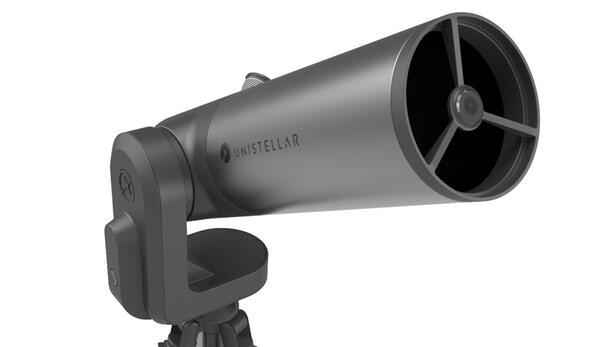The SETI Institute, in partnership with French startup Unistellar, wants to up the game for amateur astronomers by marketing a new small telescopethat acts as a crowd-sourcing instrument. The Unistellar eVscope is a computerized 4.5-in (11.4-cm) reflecting telescope that combines advanced optics with networking technology that allows amateurs to work together on observation campaigns feeding a central database.
Small, portable astronomical telescopes are great fun, but after looking at the Moon and the four closest planets, it starts to get a bit samey. The problem is that small scopes have very limited light-gathering capabilities and to do any serious work, like sky photography, they need complex equatorial mounts so they track the stars through the night.
The eVscope is designed to change that with a lightweight, portable design and a trio of features that give it the capability of larger telescopes and the ability to join forces with other eVscopes.
The first of these is Enhanced Vision, which uses light amplification technology to produce brighter, more colorful images in sharp focus, similar to what one sees in wider aperture instruments. Though this does come at the price of a few seconds delay as the eVscope collects and processes the light.
The second feature is Autonomous Field Detection (AFD), which replaces the traditional equatorial mount with much simpler two-axis azimuth mount. Using GPS and connected to a database of tens of millions of celestial objects, it can not only automatically align with a specific object, but can also automatically identify and name what it’s pointed at.
But the party piece of the eVscope is the Campaign Mode. Developed by the SETI Institute, it allows groups of amateur astronomers to work together on coordinated projects. When activated, the Campaign Mode collects image data from various eVscopes and transmits it the SETI Institute headquarters in Silicon Valley. There the images form part of a growing data repository for specific objects annotated by date, time, and location. According to Unistellar, this could be used as part of a network looking out for potentially dangerous asteroids.
“Unistellar’s eVscope is a powerful new instrument that can generate important data about transient events of interest to astronomers, including supernovae, near-Earth asteroids, and comets,” Franck Marchis, Senior Scientist at the SETI Institute and Chief Science Officer at Unistellar. “There is much to be gained from continuous observations of the night sky using telescopes spread around the globe, and by coordinating observations and sending alerts to users in order to study faint objects like comets or supernovae.”
A prototype of the eVscope is currently undergoing testing at the SETI Institute while the partners seek funds to develop a new commercial version aimed at the mass market in preparation for a presale crowdfunding campaign later this year.
The video below demonstrates the eVscope technology.
Source: http://bit.ly/2tFV8YI











